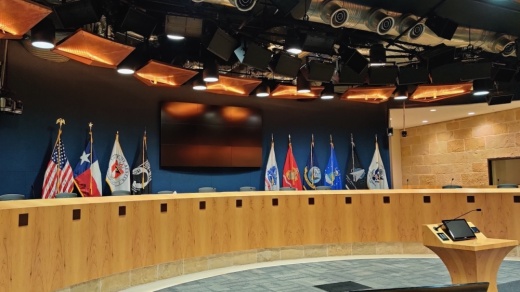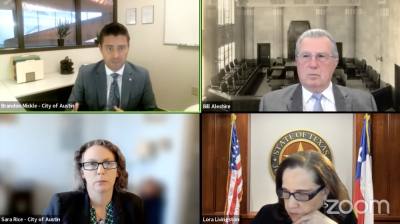As of this month, only the positions of mayor and five council seats are set to appear on Austin's November ballot. Now, council members Vanessa Fuentes, Chito Vela, Mackenzie Kelly, Leslie Pool and Alison Alter could be pushed into a race they were not scheduled to run in until 2024.
The situation stems from a lawsuit brought against all 11 current council members by a group of city voters alleging they were disenfranchised through Austin's 2021 redistricting process. That update shifted large numbers of residents among City Council districts, a result that left tens of thousands of voters with a council representative they never voted for—and would not be able to for more than two years.
"Once you move somebody from one district to another—for almost three years, by the way—then does that trigger a requirement that those voters get to vote on whether or not they want to have that representative? Or, can the government just assign you a council member and that’s who you’re going to have for the next almost three years as your council member without a right to vote? And that’s the issue. It’s never been decided before," attorney Bill Aleshire, who is representing the 13 plaintiffs, told Community Impact Newspaper.
Austin City Council members have been elected based on geographic districts rather than at large for less than a decade, and the city has never experienced a redistricting process under that current 10-1 council system.
Council members also serve staggered terms, with elections for a portion of the city's officials set every two years. Six members' terms expire next January while the other five are set to serve until January 2025.
Aleshire said a decision in his plaintiffs' favor would be "precedent-setting" for cities statewide. While similar redistricting cases have been brought in the past, Aleshire said he believes none have targeted the "threshold question" of the extent of a fundamental right to vote under the Texas Constitution. He said previous suits aimed at proving damages under the U.S. Constitution did not have success.
“You never know; the other side may be right. But their argument that these voters don’t have standing, that’s pretty ridiculous that you can take somebody’s right to vote away, and they don’t have standing to complain about it," he said. "Now whether or not we can get the relief that we’re asking for, or whether it does violate the Texas Constitution, those are fair questions to have a point-counterpoint on. And that’s what we’re doing.”
Lawyers for the city have stressed their belief that voters bringing the suit against Austin officials do not have standing in the case, and that their claims amount to "nothing more than a backdoor election recall."
“Their claimed injury is a made-up right to vote more frequently that just doesn’t exist. ... This is their desire to vote more often," attorney Brandon Mickle said during a May 12 hearing in Travis County District Court. "They had a right to vote in the last election, and if they’re in the district in which they can vote again, those people who are not plaintiffs can vote again by the very scheme that has been set up and voted on by voters here in Austin.” As proposed by Aleshire and the resident plaintiffs, a possible solution to "disenfranchisement" would add all City Council districts to the November ballot in Austin following a ruling in their favor.
To preserve the city's staggered term limits, council seats added as a result of the lawsuit would be placed on the ballot to fill a vacancy for the remainder of their ongoing terms—two years—while offering incumbents the chance for re-election. Council seats already on the ballot would have no change and be up for a full four-year term as scheduled.
Since the mayor's seat, a citywide position, is already on the November ballot in every council district, Aleshire said the potential additions would result in no extra election costs to the city.
Redistricting in question
Voter registration records from the Travis County Tax Office show more than 40,000 Austin residents had their representation shifted by the new City Council district map approved last year. Of that group, Aleshire identified 34,651 as eligible to vote as of last fall and classified the majority—nearly 23,000—as "disenfranchised" given their move from a council district with an election this November to one with no election until 2024.
Aleshire also labeled two smaller groups as either benefiting or experiencing no change due to redistricting. Just over 5,000 "advantaged" voters moved from a district without an election this year to one with a November contest, while 6,864 voters with "preserved" rights experienced a move between two districts each having November elections, according to Aleshire's breakdown.
Judge Lora Livingston, who presided over the May hearing, repeatedly pressed Aleshire about the possible side effects of correcting the alleged disenfranchisement. Livingston said the potential disruption of the four-year terms of council members elected in 2020 would in turn harm Austinites who made their choice two years ago.
“Who do I favor? The old voter who ... met their expectations for a representative for a four-year term versus the new voter who’s getting to have an influence over an election to get rid of—arguably, possibly—someone that thought they were going to be there four years that might only be there two," she said. "That’s the fight that’s teed up here.”
Despite the case hinging on Austin's redistricting process, Aleshire said he does not blame Austin's Independent Citizens Redistricting Commission, the resident body that redrew boundary lines last fall, for the voter shifts. Instead, he labeled the issue as an oversight in city code that was never corrected after Austin moved to the 10-1 council system almost a decade ago.
"As far as the ICRC is concerned, they didn’t do anything wrong. And we’re not challenging their redistricting decisions—though I did point out that they swapped a lot of votes. ... What they did is they compounded the number of voters who were disenfranchised, so to speak," he said.
Attorneys for the city said any contention tied to the 10-1 council system and recent redistricting is irrelevant given that those processes are already set in the city charter—and which Austin voters, if they choose, could amend. Livingston also highlighted the point that, rather than a court ruling, a change could be made either through a charter election in Austin or a decision by the Texas Legislature to hold a constitutional amendment election specific to the issue.
Court outcomes
Despite that note, Livingston said she will rule on the case. However, hers may not be the final word.
Following the May hearing and forthcoming decision out of Travis County, the Texas Supreme Court is also poised to hear the case. After initially submitting his petition in the county district court this spring, Aleshire simultaneously filed with both the Third Court of Appeals and Supreme Court to expedite a final ruling. The appellate court has already stepped aside, leaving the Supreme Court open to potentially consider the issue with Livingston's input in the near future.
Livingston said she plans to issue her decision as soon as next week. And after hearing arguments and questioning the city and plaintiffs' attorneys, she said both sides offered a "legitimate" perspective that requires additional balancing and consideration.
“The reality is that one side may prevail. It does not mean that the court does not appreciate the rights at stake, the interests at stake and the importance of the issues at stake in the litigation," she said.






